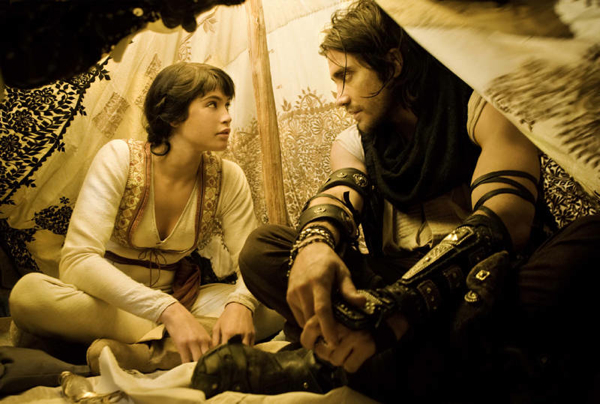Movie review by Greg Carlson
The minor clamor over racially insensitive casting in “Prince of Persia: The Sands of Time” will probably be one of the only memorable aspects of the film, a Jerry Bruckheimer production that attempts to do for video games loosely based on the sixth century Middle East what “Pirates of the Caribbean” did for the Disney theme park dark ride. Hollywood’s long tradition of dubious casting (Warner Oland as Charlie Chan, John Wayne as Genghis Khan, Mickey Rooney as Mr. Yunioshi, Jennifer Jones as Han Suyin, and on and on) is aligned closely with the prospective bottom line, so it is hardly a surprise that a chiseled Jake Gyllenhaal would step into the title role, despite his lack of Iranian heritage.
Constructed loosely from Jordan Mechner’s 2003 iteration of his successful video game franchise, “Prince of Persia” continues the conflation of movies and software on a scale significantly larger than previous game-to-film translations including “Super Mario Bros.,” “Mortal Kombat,” “Lara Croft: Tomb Raider,” “Resident Evil,” and “Doom.” As expected, the narrative replicates elements of game play, especially in the magical properties of the movie’s MacGuffin, the ornate Dagger of Time, which allows operators to rewind into the past for “do-overs.” Not surprisingly, the movie’s action orientation trumps any kind of exploration of the philosophical underpinnings of time travel, from time loop logic to other intriguing paradoxes that have been a staple of science fiction for years.
Lavish production values, abetted by unhealthy levels of computer-generated imagery, fail to mask the phony exoticism of the film’s “One Thousand and One Nights” aspirations. “Prince of Persia” is too stiff to conjure up many allusions to snappy, entertaining precedents – its scattershot cultural signifiers are vaguely reminiscent of the animated “Aladdin.” Some viewers will certainly wish they were watching other, better Islamic-themed spectacles like Douglas Fairbanks’ 1924 “The Thief of Bagdad” or “Raiders of the Lost Ark” instead. This time, Alfred Molina avoids the spikes but suffers a more terrible fate: playing the grotesque, ostrich racing “small business owner” whose broad comic asides are meant as relief to Gyllenhaal’s square-jawed earnestness.
The little excitement “Prince of Persia” has to offer arrives in the old-fashioned, love/hate screwball sparring between muscular Prince Dastan (Gyllenhaal) and the resourceful Princess Tamina (Gemma Arterton, logging another dreary sword-and-sandal turkey on the heels of “Clash of the Titans”). The attractive performers share a comfortable chemistry, but the sexless script, demographically targeted at young boys, chastely sidesteps all but the tiniest hints of romance. Mostly, the supporting players make leaden quips in reference to Tamina’s reputation as a dazzling beauty.
Manohla Dargis has already noted that the movie is “generically insulting and relatively innocuous,” which is a fairly kind way of saying that “Prince of Persia” is too dull to get worked up about. Other than Molina, whose wisecracks are at least intended to be funny, nobody involved with the production seems to realize that “Prince of Persia” should not be taken so seriously. Ben Kingsley, whose groomed goatee, shaved head, and inky eyeliner make him a dead ringer for Anton LaVey, navigates the duration of his performance as if his evil uncle Nizam belongs in a heavy drama by Strindberg or O’Neill. One keeps waiting for Kingsley to wink at the audience, but it never happens, and “Prince of Persia” takes its place as a feature-length commercial for action figures and Lego sets.
